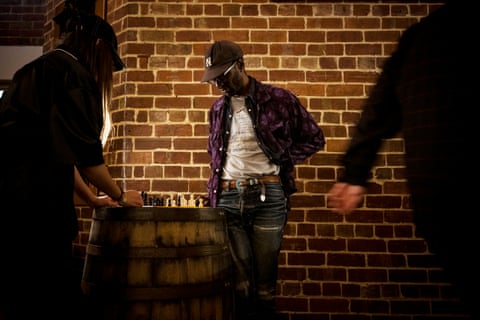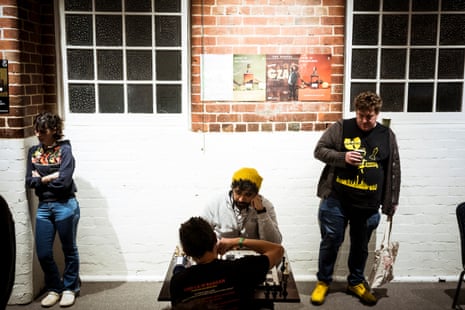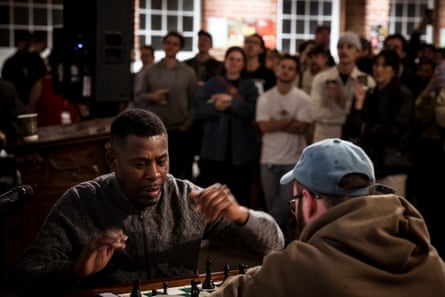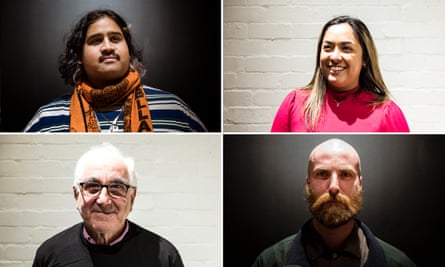A restored church in Melbourne’s north was the venue this week for an evening of chess fused with hip-hop

Players at a speed chess competition hosted by GZA of the Wu-Tang Clan in Melbourne
by Jo Khan;
photography by Christopher Hopkins
GUARDIAN AUSTRALIA
Thu 18 May 2023
Two clocks count down, not quite in sync, and there’s a collective intake of breath in the hall where more than 100 people stand transfixed by the projection of a chess game on the wall. Two hands dart across the board. White’s clock hits zero, black wins with one second left on theirs, and the tension in the room is released. The players smile at each other and raise their arms in a sort of acknowledgment of their captivating game.
On one side of the table is Stephen Lewinsky, a Melbourne doctor and former Australian junior chess champion; on the other side is the pre-eminent hip-hop artist and founding member of Wu-Tang Clan, GZA.

Thu 18 May 2023
Two clocks count down, not quite in sync, and there’s a collective intake of breath in the hall where more than 100 people stand transfixed by the projection of a chess game on the wall. Two hands dart across the board. White’s clock hits zero, black wins with one second left on theirs, and the tension in the room is released. The players smile at each other and raise their arms in a sort of acknowledgment of their captivating game.
On one side of the table is Stephen Lewinsky, a Melbourne doctor and former Australian junior chess champion; on the other side is the pre-eminent hip-hop artist and founding member of Wu-Tang Clan, GZA.

Stephen Lewinksy and GZA after their match
These most unlikely of opponents have been brought together in an unassuming restored church hall in the inner Melbourne suburb of Fitzroy North for a speed chess tournament. GZA, who completed the Australian leg of Wu-Tang and Nas’s NY State of Mind tour on Sunday, has hosted similar events in the US but this is the first time he has fused the two elements of popular culture in Australia.
These most unlikely of opponents have been brought together in an unassuming restored church hall in the inner Melbourne suburb of Fitzroy North for a speed chess tournament. GZA, who completed the Australian leg of Wu-Tang and Nas’s NY State of Mind tour on Sunday, has hosted similar events in the US but this is the first time he has fused the two elements of popular culture in Australia.

‘This whole thing is pretty wild,’ says James Benjamin, co-founder of Acid Chess Club
“It makes sense,” says the night’s MC, N’fa Jones, pre-empting any bewilderment. Jones, an African-Australian hip-hop artist of 1200 Techniques and Cool Out Sun, says Wu-Tang’s “music, energy and unapologetic force” helped raise him and he sees the alignment of chess and hip-hop clearly. “Hip-hop, as a culture, is multifaceted,” he says. “People think it’s just rapping or something but there’s so many elements to it. And I think chess – understanding the game, you make your next move, your best move, planning, recognising, strategy – it’s an important part of hip-hop and just life and culture in general.”
Jones sees GZA’s passion for and skill at chess as a natural extension of his approach to the genre. “GZA has always pushed the intellect in hip-hop,” he says. “Not just through rapping it in bars, but how he lives his life. And that is, you know, a heavy chess player to the point that we’re running an event like this where, I think he did 17 straight bouts.”
“It makes sense,” says the night’s MC, N’fa Jones, pre-empting any bewilderment. Jones, an African-Australian hip-hop artist of 1200 Techniques and Cool Out Sun, says Wu-Tang’s “music, energy and unapologetic force” helped raise him and he sees the alignment of chess and hip-hop clearly. “Hip-hop, as a culture, is multifaceted,” he says. “People think it’s just rapping or something but there’s so many elements to it. And I think chess – understanding the game, you make your next move, your best move, planning, recognising, strategy – it’s an important part of hip-hop and just life and culture in general.”
Jones sees GZA’s passion for and skill at chess as a natural extension of his approach to the genre. “GZA has always pushed the intellect in hip-hop,” he says. “Not just through rapping it in bars, but how he lives his life. And that is, you know, a heavy chess player to the point that we’re running an event like this where, I think he did 17 straight bouts.”

Competitors speed through a match in the early rounds on Monday night
In a grey knitted sweater, blue jeans and black sneakers, the introspective man hunched at the board doesn’t cut that much of a different figure from when he’s rapping bars, but ask about chess and a boyish excitement appears on his face. Using a checkers board and transparent, neon pink and green chess pieces, a nine-year-old GZA learned the rules of chess from his cousin. “He told me the name of each piece and their functions, their mobility, how they move,” GZA says. “And I kept that with me but I never played a game.”
It wasn’t until the early 1990s when he linked up with rapper Masta Killa that GZA actually started playing chess. The pair once played 78 consecutive games in 12 hours and now GZA plays every chance he gets. “I have a passion for it,” he says. “It’s a mind-worker … for strategy, critical thinking, planning two, three, four steps. I just love the game.”
In a grey knitted sweater, blue jeans and black sneakers, the introspective man hunched at the board doesn’t cut that much of a different figure from when he’s rapping bars, but ask about chess and a boyish excitement appears on his face. Using a checkers board and transparent, neon pink and green chess pieces, a nine-year-old GZA learned the rules of chess from his cousin. “He told me the name of each piece and their functions, their mobility, how they move,” GZA says. “And I kept that with me but I never played a game.”
It wasn’t until the early 1990s when he linked up with rapper Masta Killa that GZA actually started playing chess. The pair once played 78 consecutive games in 12 hours and now GZA plays every chance he gets. “I have a passion for it,” he says. “It’s a mind-worker … for strategy, critical thinking, planning two, three, four steps. I just love the game.”

GZA flexes his brain muscles against a heat winner
He may have held on to the memories of that first Technicolor chess experience but these days he prefers classic standards on his chessboards. “I don’t want to play on a board where the pieces are the Byzantine empire, or a certain dynasty, and the pieces are so fancy it’s hard to distinguish sometimes,” he says. “You know, I want the pawn to be a pawn and not look like a bishop.”
Playing chess with one of the world’s pre-eminent rappers wasn’t on the cards for DJ James Benjamin a few years ago, when amid Melbourne’s Covid lockdowns he started teaching the artist Jack Irvine how to play chess. It still wasn’t on the cards when the city finally emerged from restrictions at the end of 2021 and the pair founded Acid Chess Club.
He may have held on to the memories of that first Technicolor chess experience but these days he prefers classic standards on his chessboards. “I don’t want to play on a board where the pieces are the Byzantine empire, or a certain dynasty, and the pieces are so fancy it’s hard to distinguish sometimes,” he says. “You know, I want the pawn to be a pawn and not look like a bishop.”
Playing chess with one of the world’s pre-eminent rappers wasn’t on the cards for DJ James Benjamin a few years ago, when amid Melbourne’s Covid lockdowns he started teaching the artist Jack Irvine how to play chess. It still wasn’t on the cards when the city finally emerged from restrictions at the end of 2021 and the pair founded Acid Chess Club.

The winner of each round on Monday won the right to play GZA
But on Monday night he helped Melbourne distillers The Gospel bring together lovers of chess, hip-hop and whiskey to experience a previously unimaginable crossover. “This whole thing is pretty wild,” Benjamin says. “I got a call from The Gospel, they needed someone to run the chess tournament, I wasn’t going to say no.”
On one side of the old church hall there are two rows of eight tables. Every 30 minutes, Benjamin herds the next round of 16 players to their seats for 3/2 blitz chess elimination (three minutes for the whole game with two seconds added every move). The winner of each round gets to step up to the main table under lights to play GZA.
Rox Ziffer methodically wins her way through her round, surrounded by a small but rapturous support crew. She says being a fan of GZA makes her more nervous to play him. “It’s funny actually, my boyfriend and a bunch of his mates all started getting really into chess in the last six months and they love hip-hop and Wu-Tang Clan, so when this came about they were like, ‘Oh my gosh, what an opportunity,’” she says.
But on Monday night he helped Melbourne distillers The Gospel bring together lovers of chess, hip-hop and whiskey to experience a previously unimaginable crossover. “This whole thing is pretty wild,” Benjamin says. “I got a call from The Gospel, they needed someone to run the chess tournament, I wasn’t going to say no.”
On one side of the old church hall there are two rows of eight tables. Every 30 minutes, Benjamin herds the next round of 16 players to their seats for 3/2 blitz chess elimination (three minutes for the whole game with two seconds added every move). The winner of each round gets to step up to the main table under lights to play GZA.
Rox Ziffer methodically wins her way through her round, surrounded by a small but rapturous support crew. She says being a fan of GZA makes her more nervous to play him. “It’s funny actually, my boyfriend and a bunch of his mates all started getting really into chess in the last six months and they love hip-hop and Wu-Tang Clan, so when this came about they were like, ‘Oh my gosh, what an opportunity,’” she says.

Clockwise from top left, competitors James Benjamin, Rox Ziffer, Rhys Lloyd and Stephen Lewinsky
The tournament blends seamlessly with the vinyl DJ sets of hip-hop, soul and funk from Mr Lob and Deejay Mathematics, plus some intermittent freestyling from Jones. Rhys Lloyd, a member of Benjamin’s Acid Chess Club, wins his round but plays down his impending game with GZA, also known as “the genius”. “It’s cool to meet him but it’s just kind of like a chess night.” The barista says he doesn’t really listen to Wu-Tang Clan but that “it will be cool to tell my friends that I played chess against fucking GZA”.
GZA walks in to the hall at 6.30pm, hangs his jacket on the back of his chair and sits down to play two-and-a-half hours of speed chess. In between moves he rests his elbows on the table and in between games he leans back to stretch his arms over his head. But he never gets up from his chair. After three nights of arena shows in Brisbane, Sydney and Melbourne, this is where he wants to be.
The 56-year-old doesn’t really engage with the enthralled audience, but he smiles as his opponents sit down and exchanges a few words with those who want to. He wins some, he loses some. Lewinsky thinks GZA the chess player is “quite careful, makes sure he doesn’t lose any material and sticks to general principles”.
“It was a lot of fun,” he says, comparing their down-to-the-wire game to a James Bond movie “where the bomb went off in Goldfinger with seven seconds left”.
The tournament blends seamlessly with the vinyl DJ sets of hip-hop, soul and funk from Mr Lob and Deejay Mathematics, plus some intermittent freestyling from Jones. Rhys Lloyd, a member of Benjamin’s Acid Chess Club, wins his round but plays down his impending game with GZA, also known as “the genius”. “It’s cool to meet him but it’s just kind of like a chess night.” The barista says he doesn’t really listen to Wu-Tang Clan but that “it will be cool to tell my friends that I played chess against fucking GZA”.
GZA walks in to the hall at 6.30pm, hangs his jacket on the back of his chair and sits down to play two-and-a-half hours of speed chess. In between moves he rests his elbows on the table and in between games he leans back to stretch his arms over his head. But he never gets up from his chair. After three nights of arena shows in Brisbane, Sydney and Melbourne, this is where he wants to be.
The 56-year-old doesn’t really engage with the enthralled audience, but he smiles as his opponents sit down and exchanges a few words with those who want to. He wins some, he loses some. Lewinsky thinks GZA the chess player is “quite careful, makes sure he doesn’t lose any material and sticks to general principles”.
“It was a lot of fun,” he says, comparing their down-to-the-wire game to a James Bond movie “where the bomb went off in Goldfinger with seven seconds left”.

Ziffer celebrates a win in the early rounds
Lewinsky, who was “dragged here by my children”, is used to playing in front of an audience and against high-profile talent, but others who take to the centre table aren’t as confident. Already stressed from wrangling the tournament, Benjamin was reluctant to play GZA with “100 to 200 people watching you, plus being on the projector screen”.
“It’s like performing intellectually in front of people, putting your brain on the line in a way,” he says after his game. “I didn’t think about what I was doing for the first 10 moves, I thought I’d be sporadic, I ended up doing some no-no moves to throw him off but it didn’t work and he kind of boxed me in. Sitting up there with him was pretty intense, the experience of a lifetime for sure.”
Lewinsky, who was “dragged here by my children”, is used to playing in front of an audience and against high-profile talent, but others who take to the centre table aren’t as confident. Already stressed from wrangling the tournament, Benjamin was reluctant to play GZA with “100 to 200 people watching you, plus being on the projector screen”.
“It’s like performing intellectually in front of people, putting your brain on the line in a way,” he says after his game. “I didn’t think about what I was doing for the first 10 moves, I thought I’d be sporadic, I ended up doing some no-no moves to throw him off but it didn’t work and he kind of boxed me in. Sitting up there with him was pretty intense, the experience of a lifetime for sure.”

The room watches on as GZA plays a heat winner
Benjamin learned chess from his dad; Ziffer’s mum – who runs chess clubs in schools – taught her early on, too. GZA and many of his opponents on Monday night learned how to play when they were young from an older family member or friend – and he has tried to do the same for the generation after him. When GZA’s daughter was about eight years old and his son was five he decided to teach them the game.
“I showed them how to play but they weren’t really interested,” he says. “It got to a point where I would offer the winner some money, like five or 10 dollars. But they decided to stage the game and whoever wins they just split the 10 dollars. It wasn’t until my son, maybe about nine years ago, he started playing again. He loves it. He’s like, ‘This shit is the bomb, man, this is the ultimate.’”
Benjamin learned chess from his dad; Ziffer’s mum – who runs chess clubs in schools – taught her early on, too. GZA and many of his opponents on Monday night learned how to play when they were young from an older family member or friend – and he has tried to do the same for the generation after him. When GZA’s daughter was about eight years old and his son was five he decided to teach them the game.
“I showed them how to play but they weren’t really interested,” he says. “It got to a point where I would offer the winner some money, like five or 10 dollars. But they decided to stage the game and whoever wins they just split the 10 dollars. It wasn’t until my son, maybe about nine years ago, he started playing again. He loves it. He’s like, ‘This shit is the bomb, man, this is the ultimate.’”
No comments:
Post a Comment